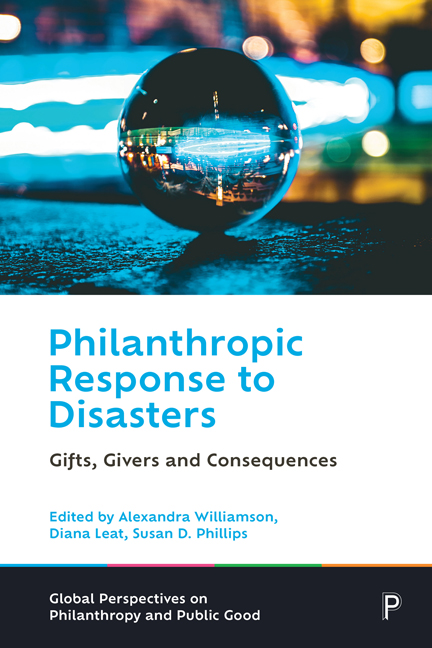Book contents
- Frontmatter
- Contents
- List of tables and figures
- Notes on contributors
- Series editors’ preface
- 1 Introduction
- 2 The public’s philanthropic response to disaster: plus ça change?
- 3 Disaster fundraising: readiness matters
- 4 Roles of philanthropic foundations as funders and distribution agents in disaster response
- 5 The private sector and disasters: from reactive response to disaster resilience
- 6 Fundraising, grantmaking and regulatory issues: regulating good in bad times
- 7 Doing good better: public policy for disaster philanthropy
- 8 Philanthropy’s place in community-based capacity development for disaster resilience
- 9 Nonprofit collaboration and coordination in disaster response: lessons from the 11 September recovery
- 10 The promise and reality of philanthropy in disasters
- 11 Conclusions and looking forward
- Index
6 - Fundraising, grantmaking and regulatory issues: regulating good in bad times
Published online by Cambridge University Press: 17 January 2024
- Frontmatter
- Contents
- List of tables and figures
- Notes on contributors
- Series editors’ preface
- 1 Introduction
- 2 The public’s philanthropic response to disaster: plus ça change?
- 3 Disaster fundraising: readiness matters
- 4 Roles of philanthropic foundations as funders and distribution agents in disaster response
- 5 The private sector and disasters: from reactive response to disaster resilience
- 6 Fundraising, grantmaking and regulatory issues: regulating good in bad times
- 7 Doing good better: public policy for disaster philanthropy
- 8 Philanthropy’s place in community-based capacity development for disaster resilience
- 9 Nonprofit collaboration and coordination in disaster response: lessons from the 11 September recovery
- 10 The promise and reality of philanthropy in disasters
- 11 Conclusions and looking forward
- Index
Summary
When a disaster occurs, philanthropic inflows of money, goods and time are quickly mobilised by a variety of intermediaries including individuals, charities, foundations, government agencies and commercial facilitators. The efficient and effective distribution of these resources is not straightforward, as illustrated by the countless media criticisms, invariably directed at the intermediary, after every disaster. The media narrative tends to be based on the popular wisdom that all donations should be dispersed immediately, without administrative cost or paperwork, and the notion that the distribution will go to the deserving beneficiaries in appropriate, precise proportions. Are these expectations reflected in the law and regulation of fundraising intermediaries in disasters? If not, what is the situation?
This chapter addresses the main legal issues that arise in disaster appeals and examines how law and regulation, in a broad view and using these terms interchangeably, govern the collection and distribution of funds in disaster response. This encompasses the public-facing common law, and statute, specifically the law of gifts and charitable trusts, criminal law, and statutes that deal with public collections generally. It also involves private contracts and arrangements between a donor and an intermediary, which recently, with digital giving platforms, have come to impose exhaustive standard terms and conditions. Subsector self-regulatory schemes, such as the codes of conduct for disaster collections adhered to by nonprofit international development agencies, are an additional part of this law and regulation mix.
Four issues with legal implications regularly arise in the collection and distribution of disaster funds, and these appear to be replicated across English heritage jurisdictions. The first is fraud: funds are diverted to personal use and donors have been deceived as to the real purpose of their collection. The problem ranges from impersonators who seek donations at your street door, to ‘robo’ telephone calls, to a cyber platform with no intention of passing on the proceeds.
Second, even in situations where there is no untoward intention to deceive donors, there may be confusion as to the beneficiaries or means of assistance. For example, the terms of the appeal are non-existent, minimal and open to several interpretations, or the identity of the beneficiary is mistaken.
Third, the amount collected is too small or too large for the stated purposes.
- Type
- Chapter
- Information
- Philanthropic Response to DisastersGifts, Givers and Consequences, pp. 109 - 132Publisher: Bristol University PressPrint publication year: 2023



